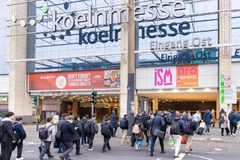DS Smith concerned UK is trailing EU paper and card recycling after latest waste statistics
.png)
13 May 2022 --- The UK household recycling rate has decreased from 46.0% in 2019 to 44.4% in 2020, according to the government's latest statistics on waste. This decrease has prompted DS Smith to call for source segregation, through which household waste such as paper, glass and plastic are collected separately to drive up recycling levels.
The e-commerce packaging giant is concerned that UK household recycling rates for paper and card are falling short of European standards. The recycling rate for paper and cardboard dropped from 69.3% in 2019 to 69.1% in 2020. According to Eurostat, the EU recycled 82.0% of its paper and cardboard in 2019, although this also declined from 84.4% in 2018.
“Today’s statistics on waste demonstrate that the UK is falling short of its European counterparts when it comes to paper and card recycling. While the pandemic has had an impact on collections, even prior to this, household recycling rates were in many cases declining,” comments Rogier Gerritsen, head of recycling at DS Smith.
“Yet despite this, the UK has set ambitious targets for its overall recycling rates over the next decade. The disparity between the ambitious targets set and actual recycling trends suggests a need for us to rethink our recycling infrastructure. Through Source Segregation, where household waste such as paper, glass and plastic are collected separately, there is a golden opportunity to help increase the quality of recycling in the UK, which will help push recycling rates forward.”
“It is important that the government has been engaging with the sector on its recent consultations around recycling reform, and indeed we already have pockets of excellence within the UK. We look forward to continuing to work with the government and the recycling sector to make sure we can effect positive change.”
The Dirty Dozen
Earlier in the year, new DS Smith research exposed the “Dirty Dozen” – the top 12 items contaminating mixed or paper recycling streams due to plastic and food presence. The most commonly recycled culprits include junk mail, food trays and pulp fruit trays.
.png) DS Smith has called for source segregation to create purer recycling steams for household waste like paper.The research also shows that over a third (36%) of UK consumers don’t believe their recycling impacts the environment. The “Dirty Dozen” results in an average of 391 million bin bags worth of plastic waste being collected from one paper mill alone every year.
DS Smith has called for source segregation to create purer recycling steams for household waste like paper.The research also shows that over a third (36%) of UK consumers don’t believe their recycling impacts the environment. The “Dirty Dozen” results in an average of 391 million bin bags worth of plastic waste being collected from one paper mill alone every year.
DS Smith, which reportedly recycles up to a third of all paper in the UK, also found that almost half (48%) of consumers don’t think packaging in the UK is easily recyclable, with two-thirds (67%) saying there is a lot of conflicting advice on recycling and a similar number (60%) saying that the disposal instructions on items are hard to find.
The analysis was conducted at Kemsley mill, the largest recycled paper mill in the UK, in partnership with YouGov. The most common “Dirty Dozen” items put in the recycling bin are junk mail (72%), food trays (38%) and pulp fruit trays (28%) – with soup cartons (21%) and crisp tubes (18%) also making an appearance.
What can be done?
A DS Smith spokesperson tells PackagingInsights that these research findings should help policymakers in a number of ways – “firstly by restricting the use of composite or hard-to-recycle packaging through taxation and bans. We have seen this with the ban of certain single-use plastic items such as plastic straws and stirrers which can’t be recycled.”
“The proposed extended producer responsibility system for the UK should bring in eco-modulation, making it more expensive to place hard-to-recycle packaging on the market,” they continue.
“Also, harmonization and consistency in labeling and household recycling collections would go a long way to help confused consumers. Policymakers need to work toward one clear and consistent system that prioritizes material quality and ensures that packaging gets recycled.”.png) DS Smith reportedly recycles around a third of all paper in the UK.
DS Smith reportedly recycles around a third of all paper in the UK.
Targets not met
England failed to reach its target to recycle 50% of household waste by 2020. In 2020, the household waste recycling rate in England was 44.0%, down from 45.5% in 2019. The UK government says this decrease reflects the impacts of the COVID-19 pandemic. Total household waste increased to 22.6 million metric tons in 2020 from 22.1 million metric tons in 2019, as people spent more time at home due to lockdowns.
In the UK, the highest recycling rate achieved in 2021 (based on provisional figures) was 76.0% for metal, followed by 73.6% for glass and 70.6% for paper and cardboard.
Provisional figures for 2021 also show that 63.2% of UK packaging waste was recycled, similar to 2020. The UK generated 222.2 million metric tons of total waste in 2018, with England responsible for 84% of the UK total.
By Joshua Poole










